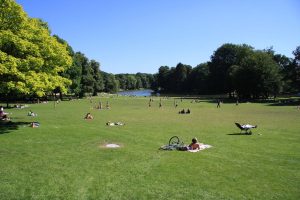FAQ
About application and admission
Which are the steps for enrolment in the Master?
Please follow the instructions on our application page. In order to apply, you have first to download and fill in the application form. You also need three recommendation letters. Send all the documents (including grades on your former studies and any other additional information) plus a letter of motivation to the Director of Graduate Admission before September 30 (for EU Citizens) and April 30 (for non EU citizens).
Which are the steps for enrolment for a PhD thesis?
After the Master years or the Doctoral Training year, the Doctoral School decides about the admission to the thesis writing phase. In order to be admitted to the Doctoral School, a student must have finished her/his course work with an average grade of at least 14 (which roughly compares to a grade of B+ in the American system), and a minimum grade of 12 in each individual course. Furthermore, one of the ECARES members must be willing to supervise the student.
I have already a master degree. Can I enroll in the ECARES Doctoral School Program?
Yes! Having a master degree equivalent to 120 credits (2 years) and with a quantitative level similar to ours are the two requirements for admissibility in either the Doctoral Training year or the thesis writing phase. See here for more information.
I have another question about the application procedure or the criteria for admission, can you help me?
Please send an email to anne-marie.notarianni@ulb.ac.be and we will do our best to help you.
About fees and financial aids
How much does the Master and the Doctoral Training cost?
The Master costs approximately €840 per year for EU citizens. For non EU citizens, some extra fees might be added for the master years. The Doctoral Training costs approximately €840. See here for more information.
How can I get a scholarship?
In principle, ECARES does not offer scholarships during the two master years. Funding is possible for the thesis writing stage. In practice, all our PhD students in the writing thesis phase are financed. Full time research scholarships, teaching assistantships and part time jobs are possible options. In one way or another all our PhD students get financed. See here for the various funding options.
Can I become teaching assistant?
Every year there are several teaching assistant positions available. Most, but not all, require some basic knowledge of French.
About the Master and the Thesis years
What happens if I do not want to pursue the PhD after the master?
Nothing! You are by no means obliged to pursue a PhD in economics (at ECARES). If you completed the research master, you will receive your Master diploma and that’s it.
And if I want to continue?
Can I profit from other universities’ expertise in Belgium
Yes. There are strong contacts and links with other Belgian universities, in particular with the Center for Operations Research and Econometrics (CORE) at the Université catholique de Louvain and the Economics Department of the Katholieke Universiteit Leuven (KULeuven). You may take doctoral courses at other universities, and you may also contact faculty from the other universities if this is needed for your research.
Can I visit some other university in Europe during my PhD?
Yes. ECARES is part of the ENTER network, consisting of nine top European universities. You are encouraged to spend some time in one of the universities. You can also visit universities that are not part of the ENTER network. The choice of the university depends on your research topic and on the opinion and contacts of your supervisor.
Can I do internships during my PhD?
Yes! It is a good idea to gain some professional experience during your PhD. But you should first ask your advisor and get her/his agreement.
Should I interact with colleagues and faculty?
Absolutely! The course work is challenging, and working in group is encouraged. The faculty is always available to meet with you and help you with your problems.
About the University
What services are provided by the University?
The university provides with all kind of services you may expect. Restaurants, travel agency, sports facilities, library, medical service, and many more.
Where is the campus?
The campus is situated at the very end of the most illustrious avenues of the city, Avenue Louise, and just next to the biggest park of the city, Bois de la Cambre.


Is the campus accessible by public transportation?
Yes. You may reach the campus by tram or by bus. See here fore more information.
Do I have to speak French at ECARES?
Not at all. At ECARES, the working language is English. We are a truly international community with PhD students and staff from all over the world.
About the accomodation and the city
Can the university help me to settle down?
Yes, the ULB has a mobility center that helps you with every practical aspect of your arrival at our university.
Where can I find an apartment or a student room?
One way to find an apartment in Brussels is choose the area where you want to live, and to walk through it. Tenants post rental announcements in the windows and doors of the available apartments. There is also a newspaper, “vlan”, and several web sites like “immoweb” or “Le Vlan” with real estate ads.
As for the student rooms, the best is to look at the campus for the announcements that other students post in the restaurant area.
I don’t speak French or Dutch, can I survive in Brussels?
Absolutely! Brussels is a very international city with many foreign inhabitants. Moreover, locals are proud of Brussels being the capital of Europe, and they are very open to foreigners. They are always ready to help you.
How do I reach Brussels?
Which are the cards and permission I need have to get in Belgium?
Once you arrive to Belgium, you will have to enrol at the university. You will also have to register at the city hall and get a the social security card. The social security card is needed if in order to be reimbursed for any medical expenditures. More information here


